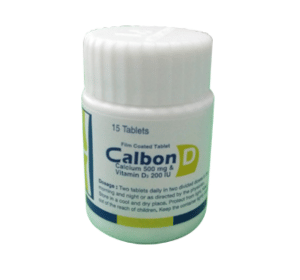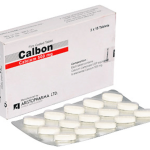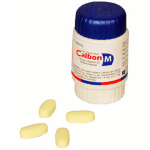Calbon D (Calcium + Vitamin D3)

Therapeutic Group : Vitamins & Minerals
Presentation:
Calbon D Tablet: Each tablet contains Calcium carbonate USP 1250 mg equivalent to 500 mg of elemental calcium & vitamin D3 BP 200 IU as Cholecalciferol.
Indications:
Calcium & vitamin D3 is indicated in
Treatment of osteoporosis, rickets, osteomalacia, tetany and parathyroid disease.
In pregnancy & lactation due to increased demand.
In kidney disease and pancreatitis.
During therapy with anti-seizure medications.
The prevention & treatment of calcium or vitamin D3 deficiency specially in the housebound and institutional elderly patients.
Dosage & Administration:
Adults, elderly and children above 12 years of age: 2 tablets per day, preferably one tablet in the morning and the other in the evening.
Contrainidications:
Hypersensitivity to any component of the product. Hypercalcaemia for example, as a result of hyperparathyroidism, vitamin D overdose, decalcifying tumours scuh as myeloma, bone metastases or sarcoidosis. Severe hypercalciuria, renal stones. Osteoporosis due to immobilization.
Warning & Precautions:
Hypercalcaemia should particularly be avoided in digitalized patients. Patients with mild to moderate renal failure (commonly found in the elderly) hypercalciuria should be supervised carefully with periodic checks of urinary calcium excretion and plasma calcium levels.
Urinary calcium excretion should also be measured in patients with a history of renal stones to exclude hypercalciuria.
Side effects:
The use of calcium supplements causes mild gastro-intestinal disturbances, such as constipation, flatulence, nausea, gastric pain, diarrhoea. Following administration of vitamin D supplements occasional skin rash has been reported. Hypercalcuria, and in rare cases hypercalcaemia have been seen with long term treatment at high dosage.
Drug interaction:
The risk of hypercalcaemia should be considered in patients taking thiazide diuretics since these drugs can reduce urinary calcium excretion. Hypercalcaemia must be avoided in digitalized patients.
Certain foods (e.g. those containing oxalic acid, phosphate or phytinic) may reduce the absorption of calcium.
Concomitant treatment with phenytoin or barbiturates can decrease the effect of vitamin D because of metabolic activation.
Concomitant use of glucocorticoids can decrease the effect of vitamin D.
The effects of digitalis and other cardiac glycosides may be accentuated with the oral administration of calcium combined with vitamin D. Strict medical supervision is needed and, if necessary monitoring of ECG and calcium.
Calcium salts may reduce the absorption of thyroxine, biphosphonates, sodium fluoride, quinolone or tetracycline antibiotics or iron. It is advisable to allow a minimum period of four hours before taking the calcium.
Use in special groups:
Use in pregnancy & lactation: Normal requirements of calcium & vitamin D are raised during pregnancy & lactation. Calcium is excreted in breast milk but not sufficiently to produce adverse effect in the infant. Allowance should be made for vitamin D / calcium for other sources.
Packing:
Calbon D Tablet: Each bottle contains 15 / 30 tablets.



